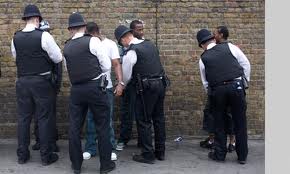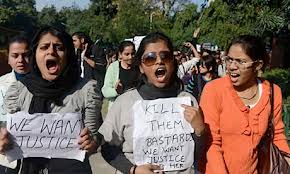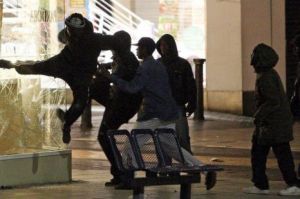Alison Saunders is not just the second woman ever to become Director of Public Prosecutions, but also a domestic goddess. Her ability to lead the CPS is as nothing to her skills with an egg whisk, apparently.
I know this after listening to Radio 4’s Profile programme on Saturday, presented by Becky Milligan. Of the 13-minute show, nearly six minutes were devoted to celebrating Saunders’ abilities in the kitchen and as a dinner party host. Her controversial (and entirely wrong) 1996 advice against holding another inquest into the Hillsborough disaster, warranted far less – just over two minutes of air time.
While we learned that Saunders makes a mean tarte tatin, and ‘light and fluffy’ cheesecake, we heard nothing about her leading the London CPS response to the 2011 riots (which earned her a Companion of the Order of the Bath). Nor was there anything about her concern that demonisation of young women, particularly if they’ve been drinking, is a barrier to securing rape convictions.
Instead, listeners were treated to a school friend revealing the new DPP ‘can cook fabulous Sunday roasts’; and that when the pair had Saturday jobs on the cream cake counter in BHS, ‘cream cakes proved very popular’. A friend from university explained that, ‘it’s always the food that’s the pivotal point of the evening,’ at a Saunders’ dinner party. This not entirely shocking (or, indeed, interesting) revelation, prompts an almost forensic level of questioning by Milligan about Saunders’ pudding proclivities, which would do one of the DPP’s cross-examining barristers proud.
Becky Milligan: What’s the favourite [pudding], do you think?
Uni Friend: Oooh, well, it’s always something different, I means she’s –
BM: Trifle?
UF: Er, I’d say she takes on more challenging dishes than that.
BM: So, we’re not talking apple crumble.
UF: Well, she does some of the basics fantastically well, but also there’s always something else coming out, I’m just trying to think of –
BM: Prunes? [I swear I am not making this up.] Um, custard with – what is it that you have could have – what’s the best pudding you’ve ever had?
UF: I seem to remember having a very great tarte tatin, which is challenging to do, and I can remember Alison cooking
one of those, but equally she will do the crumbles and the basics, as well. There’s normally a good choice there, when you’re being entertained by them.
School Friend: She cooks cakes, puddings. It really is amazing. I think, the phrase, ‘I don’t know how she does it,’ really suits Alison. Joking aside, It is amazing, I have no idea how she fits it all in, actually.
BM: What is your most memorable pudding at her house?
SF: Actually, one of the most recent was absolutely delicious.
BM: What was it?
SF: Wonderful cheesecake that was light and fluffy. It was a cheesecake. It was a new recipe that she tried.
This toe-curling segment, lasting nearly two minutes, is accompanied throughout by music from the Great British Bake Off. The programme then segues, somewhat surreally, into a news bulletin of the 1989 Hillsborough disaster, followed by an altogether more pertinent comment about Saunders from the spokesperson for the Hillsborough Justice Campaign.
At one point, the former solicitor-general, Edward Garnier MP (to whom Saunders used to report), is even asked
whether she ever baked for him. (‘I have unfortunately never had one of her cakes….’ ).
I should declare a slight interest, here. I interviewed Saunders as part of the Guardian/LSE ‘Reading the Riots’ research, and found her both impressive and approachable. She subsequently accepted an invitation to a Women in Journalism party, and I can confirm that, yes, she does seem pretty good company – a point probably worth mentioning in any profile.
But for Radio 4 to subject a senior woman, doing an important and gritty job, to such fluffy, demeaning treatment is just jaw-dropping. Is Becky Mulligan auditioning to be the next Alan Partridge (now that Steve Coogan is winning plaudits as a serious actor)? Would she have asked the solicitor-general if he’d ever sampled any of Saunders’ male predecessors’ cupcakes?
It’s difficult enough for women in public life to be taken seriously as it is, and, whatever the intention, patronising Saunders in this way, can only serve to undermine her authority, both within the organisation she leads, and beyond.
If anyone is left in any doubt as to whether the DPP is more than just a pinny-wearing marvel, she should use her new powers to have Milligan tried for crimes against serious journalism, and acts preparatory to sexism. Trust me. It’s an open and shut case.


















